DEAR DORA
New York State Representative, Staunch Abolitionist Charles Baldwin Sedgwick
Letters (1858-1865) from Washington, D.C.
to his wife Deborah “Dora” Gannett Sedgwick
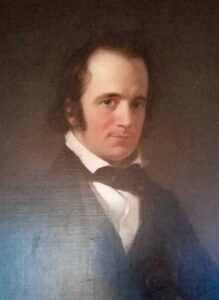
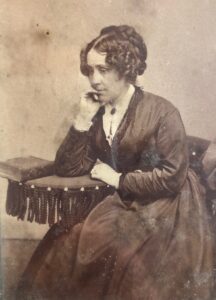
Charles and Dora Sedgwick’s plight to end slavery begins shortly after their honeymoon, early in the first decade of their marriage. In their hometown of Syracuse, New York – the “great central depot” of the Underground Railroad – Charles joins the vigilance committee, which fights against the re-enslavement of runaways. Then, in that city, on October 1, 1850 Federal Marshalls capture a fugitive named “Jerry” stating compliance with the Fugitive Slave Law. The Marshalls chain Jerry to a cart and parade him through the city where an anti-slavery convention is underway. Charles and other abolitionists devise a plan. They spread word of Jerry’s plight and thousands of outraged citizens march in the streets chanting “Free Jerry!” Despite Copperheads turning up, a group of ten white men break into the jail in which Jerry is held and with a battering ram free and whisk him away to Canada. For the next two years Charles represents Jerry’s rescuers in trial while the incident fuels flame on the slavery debate North and South.
Dora – described by her friend Nathaniel Hawthorne as “a bright, vivacious, dark-haired, rich complexioned, enchanting damsel” – is a devoted speaker and published author on topics of abolition, women’s rights, education, and religious freedom. In 1859 her husband wins the seat of New York State Representative and the following year just prior to the outbreak of the American Civil War he is the first person to give a speech on the House floor denouncing slavery.
When guns fire at Fort Sumter April 12, 1861 the Civil War begins and tensions mount. In Washington Charles toils with legislators, continues to work with freedom fighters, and codifies laws for the Navy. Unswerving in his anti-slavery stand of “no compromises, no concessions” his first concern is to “deal at any cost a death blow to the institution which countenances the enslavement of human beings.” He proposes Bills to allow Blacks to serve in the war effort and be paid the same as White soldiers. Yet on the eve of yielding his mightiest attack in the Capitol a tragedy strikes on the Sedgwick homestead, testing not only Charles’s courage to carry on the fight but Dora’s too. As the struggle between abolitionists, slave owners, and sympathizers wages on so does the one linking husband and wife. Written from Washington to Syracuse, Charles Sedgwick’s letters are a narrative of a staunch abolitionist serving two terms in Congress during the most crucial time to date in America’s history. His letters are rich in respect and love for his wife, their four young children and his two from first marriage; his stance to free a human race; and his artful ability to describe by pen those in Washington he either respects or despises. The Sedgwick’s lifestyle and duty to family and neighbor will remind readers of the Alcott family, as told in Louisa May Alcott’s Little Women.
June 10, 1864
Washington
Dear Dora – There is not a decently fair man in Congress who does not admit that Negroes should be paid the same as white soldiers – It is just, honest, and politic. Congress acts like the devil about this – But the time is coming! I don’t know but all this neglect and delay and quarreling is wholesome. In the end I am sure it will bring about great Negro equality. Half a dozen such men as Fred Douglass in Congress (if you could find a dozen such more white or black) would greatly improve the body and show that we believe what we have been preaching so long – I go now the largest liberty.
I have your letter to father Abraham*. Keep hammering – it is the only way. Love to all the babies from Nell down.
Your affectionate husband,
Charles
“Let me congratulate you on the honor you have achieved in being the first to speak in Congress in just and fitting terms.” Wendell Phillips, on Sedgwick’s speech about abolishing slavery
“You have done a good service to the cause of suffering humanity.” Reverend and abolitionist Samuel Joseph May (brother of Abigail Alcott, Concord, MA)
“It is not often that I am tempted by a speech in Congress to such neglect of my affairs.” James Freeman Clarke
Boston, May 20, 1862
Dear Mr. Sedgwick:
To-day a wet blanket is thrown upon the flame of popular enthusiasm by President Lincoln’s veto. What giving and taking, what blowing hot and blowing cold, we have upon this slavery question!
Depend upon it this veto will serve to increase the disgust and uneasiness felt in Europe at our shilly-shallying course, to abate the enthusiasm of the army and the friends of freedom universally, and to inspire the rebels with fresh courage and determination. It seems to me that infatuation pervades the President and his Cabinet.
Yours, for no compromise,
Wm. Lloyd Garrison
Hon. Charles B. Sedgwick
Concord, MA
April 19, 1860
Dear Mr. Sedgwick,
If you will allow an address from one who has just read your very interesting and able speech upon ‘Southern Aggression’ in a copy you sent to Bronson Alcott. Please send me one or two or even three copies, if it is not asking too much. It is a comfort to see that such things can be said on the floor of Congress at last – it seems to nullify a future such as I have almost despaired of –
It is the 19th of April and old Concord is ringing with jubilee cannon – It is true as steel to freedom – and all its blood is up hot as in 1775 as you have lately seen – Does Mrs. Sedgwick know that Anna Alcott is to be married the 23rd?
Ours respectfully,
Elizabeth P. Peabody
December 12, 1864
Dear Dora – I think what I have gained is worth all the sacrifice and pains of absence and annoyance to you. Don’t you? You are entirely mistaken in supposing me to have become wedded to this life as more pleasant than home life – It is not true and I shall return to home with quite as much pleasure as it can give me.
Your loving husband,
C.B.S.
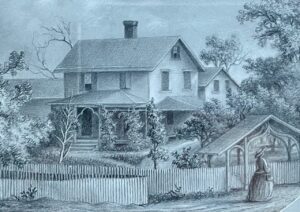
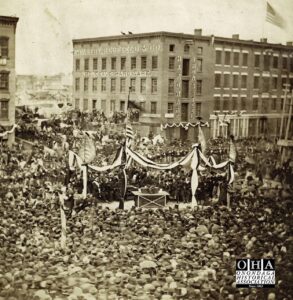
- A personal friend of President Abraham Lincoln, Sedgwick was one of the few people chosen to ride the train through the Northeast with the assassinated body. He delivered a eulogy to thousands in Syracuse.
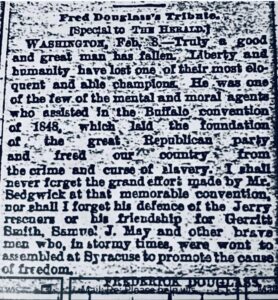
*
FLO
A Southern Belle with a Dilemma
Historical novel inspired by a true story. Sequel to Fighting for Nellie
A daughter of Dixie and the mayor of Rome, Georgia, twenty-one year old Florida “Flo” Bayard Seay, a talented writer, musician, and president of her 1898 Shorter College class is engaged, set to marry a dashing banker and local family friend. However, Flo takes a trip north by train to New York State to visit her cousin who attends Cornell University and meets twenty-eight year old James Grant Tracy, he sweeps her off her feet in ways her fiancé does not. Flo returns to “Illahee,” the Seay family plantation along side the Coosa River, but discovers her heart stays North.
What will Flo do? Her newfound love is the son of a man who fought for the Union and grandson of a staunch abolitionist, while her father and two brothers fought for the Confederacy and grandfather owned Roswell Mill, the largest cotton factory in Georgia. On top of all this, Flo is suddenly stricken with the loss of hearing and must face complicated family, society, and country ties that bind us all. The Civil War has ended but the fight between North and South rages on.
Based on a cache of letters, photographs, and news articles passed down through generations and written by a direct descendant, FLO brings to light a determined, humorous, and courageous Southern young woman who is no ‘wall flower.’ But will she have the voice to fight for her heart?
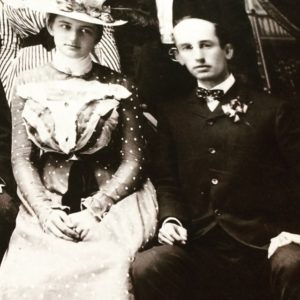
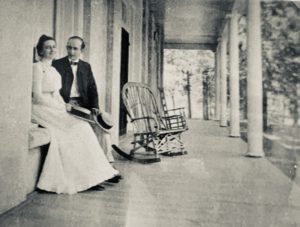
*
JOHNNY’S FLIGHT
Inspired by a True Story
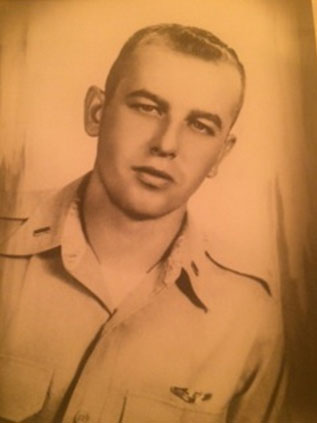
John Bayard Tracy Jr. is a young man with a dream of flight. The youngest of three children he is the ‘baby’ of the family, adored by all, especially his mother and friends in the tight knit Central New York city neighborhood, Sedgwick Farm, where he is raised during America’s Cold War. Johnny’s handsome looks, steely eyes, and smile exuding his passion for life draw people to him, including young women. There is only one, however, who captures and keeps his heart.
Since Johnny loves anything to do with action, from racing his bike to driving the red convertible jaguar he and his older brother save up for, he joins the United States Air Force, envisioning himself flying commercial flights overseas some day. As in most things he does John excels and by age 24 finds him self co-piloting classified Strategic Air Command missions to the Soviet Union, leaving behind his sweetheart for assignments which will change his life, his family’s, and that of his country forever.
*
THE WILD RIDE OF WILLIAM TRACY
True story conveying timeless lessons of courage, honor, and duty motivating any age
Genre: Children’s
When guns first fire at Ft. Sumter in April 1861, eighteen year old, patriotic Will Tracy joins the Northern war effort. Strapping on his knapsack and shouldering his rifle he marches twice across Kentucky, serving in the Western theater. Though given a position as an officer because of whom he knows, Will is determined to make his own mark. He rejoins as a private in another regiment, unknown to any, and works his way up the ranks due to his performance.
Before long he is a general’s aid in the 122nd New York State Volunteers, carrying out a secret mission during the Battle of Chancellorsville. Discovering himself in enemy territory and told to surrender, he refuses. Confederate General A.P. Hill gives the order, “Shoot him! Kill him!” Shots and shells resound throughout the field and woods beyond and Will, determined to ride down the path to death or freedom, suddenly finds himself on the ride of his life.
Confederate General Hill later states Will’s act is the boldest thing he’s ever seen done and Southern officers say Will is a “damn brave Yankee.”
*
 MESSAGE IN A BOTTLE Singing Beach
MESSAGE IN A BOTTLE Singing Beach
One sunny February morning, Sarah is walking her dog, Scout, at Singing Beach in Manchester-by-the-Sea, north of Boston, Massachusetts near where she lives. At the water’s edge, she sees a clear glass bottle floating and thinks it is trash. Scout, wagging his tail, runs off to play with a furry friend and Sarah goes down to the water’s edge to collect something she hopes to stop heading out to sea.
 As Sarah draws closer, she can not believe what she thinks she sees – a letter in a bottle. When she unscrews the top of the Nantucket Nectars glass and draws out the papers inside, Sarah finds a second letter wrapped inside the first.
As Sarah draws closer, she can not believe what she thinks she sees – a letter in a bottle. When she unscrews the top of the Nantucket Nectars glass and draws out the papers inside, Sarah finds a second letter wrapped inside the first.
Reading the letters causes Sarah’s heart, then keyboard, to beat fast. Two letters written by sisters, both mothers of young children, to their dead mother on her birthday. The letters weave a tale of two generations of women, of complicated family relationships ravished by cancer, unfinished words, and the ultimate fight for the sisters to forgive for the sake of their happiness and the next generation.
“Dear Mom, Ari and I are here together today remembering you on your birthday. We came to the beach with Esme and Hugo, your grandchildren, to send you these letters. It’s called Singing Beach which reminded us of you. There’s too much to say in one letter but I’ll do my best. I miss you, especially when you were healthy. Being sick made you a different person. It was hard for you to find joy in the world…”
“Hi Mom. Today is your birthday. You would be 62. But you’re not, because you died 6 1/2 months ago. That’s what cancer does. I still think about the end a lot. Every day. I wish things had been different. I wish you weren’t so angry with us. I know you were angry to be dying. Who can even begin to imagine what that feels like? But I wish you weren’t angry with us. Because I’m sure you regret that. We never got to have our goodbye. We never got to talk about anything and we had so much to talk about. Why did you do that? Why? You must have been so, so very scared to push us away like that. And the truth is – I’m still upset with you. I’m angry with my dead mother. And it’s a terrible thing to bear…”
*
Early American Patriot
Jacob Leisler’s Rebellion
Dress Rehearsal To the American Revolution
Historical Novel inspired by a True Story
In 1660 twenty year-old German born Jacob Leisler, son of a Calvinist French Reformed minister, immigrates from Berlin to New Amsterdam/Netherland, today New York City, as a soldier with the West India Company. Soon after his arrival Leisler sells and trades fur and tobacco and becomes the third wealthiest man in the city.
Endearing himself to the common people, Leisler befriends a widowed mother and son. Like many in New York, they are French Huguenots who arrived as refugees fleeing religious persecution by Catholics in France. They are so destitute that a public tribunal decides they should be sold into slavery in order to pay their ship charges. Leisler, however, prevents the sale by purchasing their freedom.
Fast forwarding to 1683 Leisler is appointed a judge, or “commissioner,” of the court of admiralty in New York, a justice of the peace for New York City and County, and a militia captain. As the city divides into two defined factions by wealth, poverty, religions, and ethics, The English Revolution plays out in New York. Small shopkeepers, farmers, sailors, poor traders, and artisans ally against landholders, merchants, rich fur-traders, lawyers and crown officers. Leisler leads the former while the latter, a man named Nicholas Bayard who is the nephew of Peter Stuyvesant, the ex Director-General of New Netherland, and other representatives of aristocratic Hudson Valley families.
On the night of June 2, 1689, as supporters of England’s King James II are upon seizing Fort William with the intention to massacre their Dutch fellow-citizens, an armed mob gathers to overthrow the existing government. The group cries “Leisler” as they rush to his home. Leisler seems to be the only wealthy resident in the province sympathizing with the Dutch lower classes. Within an hour Leisler receives the keys of the seized fort. The revolutionaries take advantage of the fort containing all the public funds, the return of which Lieutenant Governor Nicholson demands in vain.
Four hundred of the new party sign an agreement to hold the fort “for the present Protestant power that reigns in England,” while a committee of ten of the city freeholders assume the powers of a provisional government, declaring Jacob Leisler in charge, commissioning him “captain of the fort” (known today as the Battery in Lower Manhattan).
Thus begins “Leisler’s Rebellion” in the midst of England’s Glorious Revolution. The Rebellion is a revolt reflecting colonial resentment against King James II during which Leisler calls the first Inter Colonial Congress in America and brokers the largest New York land deal to date for immigrant Huguenots to settle on, while Nicholas Bayard escapes the city to avoid assassination.
But when an English major soon lands with two companies of soldiers demanding the fort back, Leisler refuses and chaos breaks loose. Leisler and a group of men, including his son in law, are under arrest, imprisoned for treason and murder, fighting for their lives and literally their heads, against judges who are political enemies under the influences of England, alcohol, and family ties, and whose acts are described as inhuman and ‘gross.’
A historical novel inspired by the true story, JACOB LEISLER: EARLY AMERICAN PATRIOT: Dress Rehearsal to the American Revolution, is written by a direct descendant – the 8x great granddaughter of Jacob Leisler and 9th great niece of Nicholas Bayard – Sarah Burrows. JACOB LEISLER: EARLY AMERICAN PATRIOT paints a picture of a courageous rebel under the rule of England during a pivotal period of early American history which, to date, has been under examined, as well as diverse European settlements of Native American and African populations, fused into a cosmopolitan colonial territory fighting for individual, religious, and country freedom and justice.
In 1913 the play Jacob Leisler: A Play of Old New York, about Leisler and the dramatic events of his life, was published by William Oscar Bates.
*
ROUGH SEAS: CAPTAINING THE CHINA TRADE
Genre: Historical Fiction Inspired by a True Story
Young Captain Hiram Putnam is commissioned by Boston’s wealthy merchant, ship owner and philanthropist Joseph Peabody to steer ‘The China’ trade ship to the Far East. Captain Putnam knows it will be a dangerous journey but sails away from his home of Salem, Massachusetts and his wife, who is expecting a baby, full of confidence to fulfill his mission.
It is not long, though, before Captain Putnam and his crew find themselves fighting rough seas, deadly disease, and dangerous unknown territories and enemies as they sell and trade throughout the world and struggle to get the boat, goods, and themselves back home again.
 Sarah Tracy Burrows
Sarah Tracy Burrows 